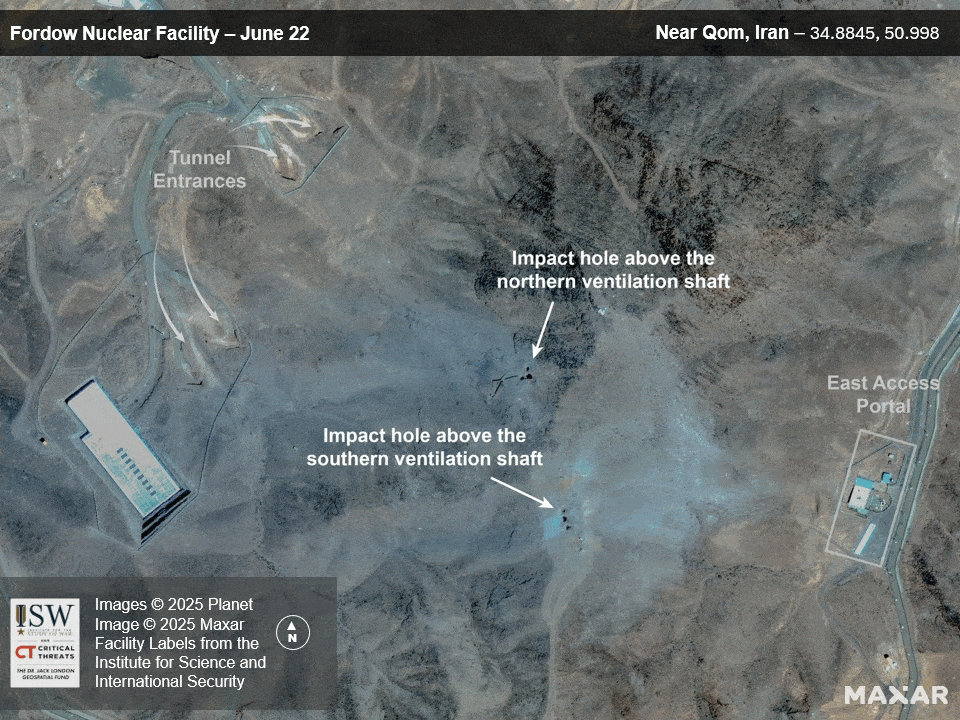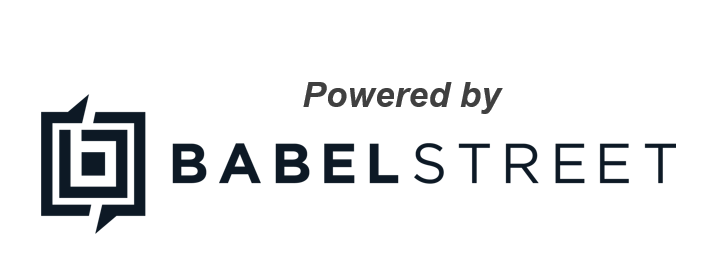{{currentView.title}}
July 13, 2025
Iran Update, July 13, 2025
Information Cutoff: 2:00 PM ET
The Critical Threats Project (CTP) at the American Enterprise Institute and the Institute for the Study of War (ISW) publish the Iran Update, which provides insights into Iranian and Iranian-sponsored activities that undermine regional stability and threaten US forces and interests. CTP-ISW publishes the Iran Update daily.
Click here to see CTP and ISW’s interactive map of assessed control of terrain in Syria, and here to see CTP and ISW’s interactive map of Israeli ground operations. The Syria map is updated daily alongside the static Syria maps in this report. CTP-ISW ended daily maps of Israeli ground operations in February 2025.
Click here to see ISW-CTP's interactive map showing the total strikes in Iran since June 12, as well as an interactive timelapse showing the strikes day-by-day.
We will publish an abbreviated Iran Update on July 12 and 13. The abbreviated update will cover updates to nuclear negotiations and information about the status of Iran’s nuclear program, military, and political scene after the Israel-Iran War. We will resume our full coverage of the entire region on July 14.
Key Takeaways:
- Iranian Nuclear Program: Iran has built new access roads and flattened earth near impact points at the Fordow Fuel Enrichment Plant (FFEP), likely as part of Iran’s efforts to assess the damage at the facility.
- Iran Nuclear Negotiations: Iranian moderates who support nuclear negotiations with the United States appear to be prevailing over Iranian hardliners who have rejected negotiations in recent days. Iran’s requirements in negotiations do not appear to be consistent with US demands, however. The Iranian regime also defines enriching uranium as a right, which stalled negotiations prior to the Israeli strikes that began on June 12.
- Iranian Nuclear Inspections: Iran will cooperate with the International Atomic Energy Agency (IAEA) despite recent restrictions imposed by the Iranian parliament, but is unlikely to allow inspections of bombed nuclear sites, citing safety and security concerns.
Iran has built new access roads and flattened earth near impact points at the Fordow Fuel Enrichment Plant (FFEP), likely as part of Iran’s efforts to assess the damage at the facility. Commercially available satellite imagery captured on July 8 and July 13 showed Iran has built additional access roads and flattened earth near the northern and southern impact points at Fordow. Iran has also covered all the impact craters caused by the US GBU-57 Bunker Buster bombs with soil, though it is unclear if the impact craters are all filled in. An expert on Iran’s nuclear program assessed on July 1 that Iran had gained access to the eastern tunnel entrance, but it remains unclear whether Iranian personnel could enter the tunnel itself. The expert also assessed that Iran had cleared access to the northern and southern impact points, temporarily covered bombed ventilation shafts, and prepared the site for future repairs or reconstruction of underground infrastructure.[i] The expert also assessed that recovery operations for any salvageable equipment or material would follow the damage assessment.[ii] The ventilation shafts at Fordow must be repaired or rebuilt to resume enrichment operations at the site, though the extent of the underground damage to the facility will also determine whether resuming operations is viable.[iii]
Iranian moderates who support nuclear negotiations with the United States appear to be prevailing over Iranian hardliners who have rejected negotiations in recent days. Iran’s requirements in negotiations do not appear to be consistent with US demands, however. The Washington Post reported on July 13 that there is “consensus” among Iran’s political class that Iran needs to resume nuclear negotiations with the United States.[iv] An unspecified Trump administration official said on July 13 that the administration believes that Iran is open to an agreement on its nuclear program despite US and Israeli strikes.[v] This is consistent with recent statements by top Iranian officials. Foreign Affairs Minister Araghchi told Iranian state media on July 12 that his ”goal in negotiating is nothing other than securing the rights, [and] interests“ of Iranians and that he would re-enter negotiations when his team ”feel that these interests can be secured.“[vi] Iranian moderate President Masoud Pezeshkian said on July 13 that he is “trying to prevent the recurrence of war and conflict by advancing the path of diplomacy” and that he believes “war benefits no one and never has a winner.”[vii] Pezeshkian’s July 13 comments seek to falsely present Iran as a peaceful, responsible actor in the Middle East while ignoring Iran’s destabilizing activities throughout the region. Pezeshkian used a similar argument during his July 7 interview with Tucker Carlson. Pezeshkian used the Tucker Carlson interview to claim that Iran is open to IAEA inspections, which is another US demand in negotiations, but Iran already appears to be conditioning how these inspections take place and what they inspect.[viii] Iran’s efforts to impose conditions on the inspections defeat the purpose of the inspections.
The Iranian regime also defines enriching uranium as a right, which stalled negotiations before the Israeli strikes that began on June 12. Araghchi's comment that he seeks to “secure” Iran’s rights suggests that Iran will likely seek to ensure it can enrich uranium. The Iranian regime defined enriching uranium as a right throughout previous nuclear program negotiations and during the 12-day war.[ix] The way that the regime defines Iranian “rights and interests” will in part determine whether a deal is reached. It is unlikely that the talks will end in a deal if the United States and Iran maintain the same negotiating positions that they had before the 12-day war. The United States has shown no inclination towards addressing any maximalist Iranian demands, especially these preconditions that go far beyond previous negotiation frameworks.
Some hardliners remain concerned about the negotiations and moderate ascendancy after the war and oppose negotiations, however.[x] An Iranian analyst close to hardline Islamic Revolutionary Guards Corps (IRCG) circles noted that the deaths of many IRGC commanders has contributed to the sense that the ”ideological and revolutionary layer has been weakened and eroded by Israel,” and that the moderates and reformists are attempting to ”sell themselves and their mental model as the savior to the Iranian people.”[xi] This analyst’s sentiment reflects the growing fear from the IRGC and those close to the hardline military-security establishment about Iranian moderate and reformist ascendancy. Part of this fear may be driven by recent efforts by moderates to reassert themselves in Iran’s political scene. Former moderate President Hasan Rouhani has lobbied senior clerics in Qom to pressure Khamenei into accepting a ceasefire and halting uranium enrichment, framing these moves as necessary to “save the Islamic system from collapse.”[xii] Senior Iranian clerics issued a fatwa on June 30 that declared US President Donald Trump and Israeli Prime Minister Benjamin Netanyahu “mohareb” (enemies of God) and called for their killing.[xiii] Hardliners are rejecting negotiations unless they occur on a maximalist basis that addresses Iranian demands in full, including recognition of Israeli aggression, investigation of US involvement, payment of war reparations, and binding security guarantees to prevent future attacks.[xiv]
Iran will cooperate with the International Atomic Energy Agency (IAEA) despite recent restrictions imposed by the Iranian parliament, but is unlikely to allow inspections of bombed nuclear sites, citing safety and security concerns. Iranian Foreign Minister Abbas Araghchi said on July 12 that "the IAEA's requests for continued monitoring in Iran will be ... decided on a case-by-case basis by the [Supreme National Security] Council with consideration to safety and security issues.”[xv] The Iranian parliament passed a law on June 25 that requires the Supreme National Security Council to approve any inspections by the IAEA.[xvi] British Foreign Secretary David Lammy warned Iran July 8 that the E3 (the United Kingdom, Germany, and France) could trigger snapback sanctions if Iran did not resume IAEA inspections, and European officials have expressed concern that the lack of IAEA inspections meant that the international community would have no visibility into the Iranian nuclear program.[xvii] The IAEA did not have full access to inspect Iran’s nuclear facilities before the Israel-Iran War, however, and several key pieces of information about the program came from Israeli intelligence, not the IAEA.[xviii] Araghchi warned the E3 on July 12 that the imposition of snapback sanctions on Iran would ”end Europe’s role” in nuclear negotiations.[xix] Araghchi also said that ”the risk of spreading radioactive materials and the risk of exploding leftover munitions ... are serious," and ”IAEA inspectors approaching nuclear sites has both a security aspect... and the safety of the inspectors themselves is a matter that must be examined."[xx] Araghchi reiterated that Iran will not agree to any nuclear deal that does not allow it to enrich uranium and that Iran will only agree to future negotiations that concern its nuclear program exclusively and will not negotiate on defense issues such as its missile program.[xxi]
[i] https://x.com/DAVIDHALBRIGHT1/status/1940151936944370134
[ii] https://x.com/DAVIDHALBRIGHT1/status/1940151936944370134
[iii] https://x.com/davidhalbright1/status/1940151936944370134?s=46&t=EGYcIyXosW6lVJmixq2r5Q
[iv] https://www.washingtonpost.com/world/2025/07/13/iran-nuclear-negotiations-pezeshkian-araghchi/
[v] https://www.washingtonpost.com/world/2025/07/13/iran-nuclear-negotiations-pezeshkian-araghchi/
[vi] https://x.com/Entekhab_News/status/1944098090681573638 ; https://t dot co/AbU0EqOcV3
[vii] https://t dot co/sIOVCaviBx ; https://defapress dot ir/fa/news/762179
[viii] https://www.pbs.org/newshour/world/watch-trump-says-u-s-approved-observers-must-inspect-irans-nuclear-program-would-bomb-again ; https://president dot ir/fa/160124
[ix] https://x.com/araghchi/status/1925669240461213916 ; https://www.reuters.com/world/iran-us-resume-nuclear-talks-amid-clashing-red-lines-2025-05-11/ ; https://en dot mehrnews.com/news/233221/Iran-warns-US-Restrain-Israel-or-it-faces-harsher-response ; https://isw.pub/IranUpdate053025
[x] https://www.understandingwar.org/backgrounder/iran-update-july-10-2025
[xi] https://www.washingtonpost.com/world/2025/07/13/iran-nuclear-negotiations-pezeshkian-araghchi/
[xii] https://iranwire.com/en/features/142441-irans-senior-clerics-stay-silent-amid-war-as-former-president-seeks-compromise/
[xiii] https://www.iranintl.com/en/202507077541 ;
https://farhikhtegandaily dot com/news/209802/
[xiv] https://defapress dot ir/fa/news/761391/
[xv] https://www.reuters.com/world/middle-east/fm-araqchi-says-iran-work-with-iaea-inspections-may-be-risky-2025-07-12/
[xvi] https://www.reuters.com/world/middle-east/iran-parliament-approves-bill-suspend-cooperation-with-un-nuclear-watchdog-2025-06-25/ ; https://www.reuters.com/world/middle-east/fm-araqchi-says-iran-work-with-iaea-inspections-may-be-risky-2025-07-12/
[xvii] https://www.understandingwar.org/backgrounder/iran-update-july-9-2025
[xviii] https://www.armscontrol.org/act/2024-03/news/iaea-warns-iran-about-lack-transparency ; https://www.understandingwar.org/backgrounder/iran-update-july-5-2025
[xix] https://www.reuters.com/world/middle-east/fm-araqchi-says-iran-work-with-iaea-inspections-may-be-risky-2025-07-12/
[xx] https://www.reuters.com/world/middle-east/fm-araqchi-says-iran-work-with-iaea-inspections-may-be-risky-2025-07-12/
[xxi] https://www.reuters.com/world/middle-east/fm-araqchi-says-iran-work-with-iaea-inspections-may-be-risky-2025-07-12/
[BC2]https://criticalthreats.imeetcentral.com/p/aQAAAAAFLNXX


